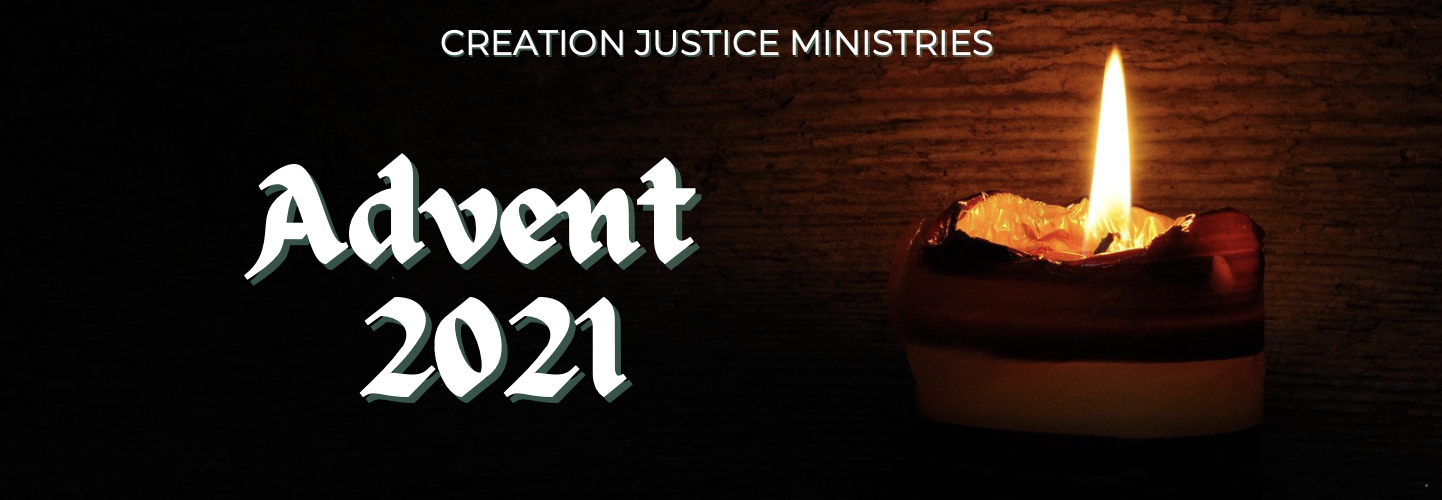|
By Avery Davis Lamb My soul magnifies the Lord, and my spirit rejoices in God my Savior, for he has looked with favor on the lowliness of his servant. Surely, from now on all generations will call me blessed; for the Mighty One has done great things for me, and holy is his name. His mercy is for those who fear him from generation to generation. He has shown strength with his arm; he has scattered the proud in the thoughts of their hearts. He has brought down the powerful from their thrones, and lifted up the lowly; he has filled the hungry with good things, and sent the rich away empty. He has helped his servant Israel, in remembrance of his mercy, according to the promise he made to our ancestors, to Abraham and to his descendants forever. In the midst of Advent darkness, the voice of Mary breaks through, singing the Magnificat: “My soul magnifies the Lord...He has brought down the powerful from their thrones, and lifted up the lowly; he has filled the hungry with good things, and sent the rich away empty.” Surrounded by the darkness of empire and oppression, Mary trusted in the hope of Christ held in her womb. She believed that, despite the powers of the empire that lift the powerful and bring down the low, God’s justice would be birthed into the world. She had hope that God’s love would break into the world as human flesh. She had hope that the child held in her womb would bring about a new economy, one driven by love and justice rather than exploitation and empire. Mary’s Magnificat is a candle of hope, luminating the darkness around her. Her song is a prophetic declaration of trust in the power of God to send away the oppressor and gather the oppressed under God’s wing. She sees a world where the injustices of climate change are flipped; where those on the frontlines are protected and restored and those profiting off the destruction of Creation are brought down from their positions of power. Mary sings a vision for what the world could be if the people of God gather together alongside Christ in the work of protecting, restoring, and sharing God’s Creation. She sees a world where the injustices of climate change are flipped; where those on the frontlines are protected and restored and those profiting off the destruction of Creation are brought down from their positions of power. May our souls magnify the Lord and rejoice in God, who has become flesh to redeem and restore the ways we have broken creation. May we birth into the world new creation and new economies, driven by love and affection, casting out the darkness of empire and exploitation.
0 Comments
Subject: ‘America the Beautiful’ Plan Organizational Comment
Creation Justice Ministries Document ID: 2021-23590 Federal Register #: 86 FR 59996 Creation Justice Ministries represents the creation care and environmental justice policies of major Christian denominations throughout the United States. We work in cooperation with 38 national faith bodies including Protestant denominations and Orthodox communions as well as regional faith groups, and congregants to protect and restore God's Creation. Creation Justice Ministries educates, equips and mobilizes Christian communions/denominations, congregations and individuals to protect, restore, and rightly share God's creation. Based on the priorities of its members, with a particular concern for the vulnerable and marginalized, we provide collaborative opportunities to build ecumenical community, guide people of faith and faith communities towards eco-justice transformations, and raise a collective witness in the public arena echoing Christ's call for just relationships among all of creation. The goal of protecting and preserving 30 percent of public lands and waters by the year 2030 (“30x30”) is an important goal that we cannot miss. The climate crisis is ever worsening and we do not have the luxury of waiting any longer to rightly care for God’s creation. As Christians, we see the world as creation -- a gift from God that blesses us with life and health. We also have the responsibility to care for creation -- protecting, restoring, and rightly sharing the abundant natural world. We see 30x30 and the America the Beautiful campaign as more than a governmental or environmental document. We see it as a moral vision that would increase our flourishing with each other, our lands, and our waters. The ocean is not only a place of majestic creation but a place of rejuvenation and climate solutions. In addition to the beautiful creatures that reside in the ocean there are so many ways the ocean can contribute to the fight against the climate crisis. Mangrove forests, tidal salt marshes, kelp forests, and seagrass meadows are all ecosystems that suck up carbon from the air and restore God’s creation. Fully and highly protected marine protected areas are the most effective tool we have for preserving ocean ecosystems. They provide areas where ocean life can recover without stress from extractive practices like commercial fishing and oil/gas drilling. While large sections of ocean in the western Pacific are protected, we have neglected to protect marine areas in the Atlantic at the same rate. The Northeast Canyons and Seamounts Marine National Monument is the first strongly protected marine area in the Atlantic, and more places like this are needed in American waters to protect each ecosystem’s unique types of marine life. We do not have the luxury to wait longer to designate more marine protected areas. Our ocean life is stressed from climate change; many species are endangered and do not have much more time. Protecting 30 percent of America’s ocean with highly and fully protected marine protected areas will help restore the health of our ocean life and will enable us to rightly care for the earth and all of God’s creation. Protecting lands is an important way to honor all who see their lands as sacred and to protect those sacred lands from extractive practices like mining and drilling. We applaud the administration’s decision to return Bears Ears and Grand Staircase Escalante National Monuments to their original size and encourage similar actions across the country. If protected from extraction, our public lands can be important tools for fighting climate change. It is important that the administration protects these places from extractive threats that are harming local communities and our global climate. We support the United States’ national 30x30 goal and applaud the Conserving and Restoring America the Beautiful report. We support the administration’s efforts to take an interdisciplinary and community-based approach to conserving 30 percent of our lands and waters. In particular, we are supportive of the following in the Conserving and Restoring America the Beautiful report:
As NOAA and other agencies prepare the next America the Beautiful report and design the implementation of 30x30, we urge the following:
With gratitude and hope for God’s creation, Creation Justice Ministries By Ched Myers John said to the crowds that came out to be baptized by him, "You brood of vipers! Who warned you to flee from the wrath to come? Bear fruits worthy of repentance. Do not begin to say to yourselves, 'We have Abraham as our ancestor'; for I tell you, God is able from these stones to raise up children to Abraham. Even now the ax is lying at the root of the trees; every tree therefore that does not bear good fruit is cut down and thrown into the fire." And the crowds asked him, "What then should we do?" In reply he said to them, "Whoever has two coats must share with anyone who has none; and whoever has food must do likewise." Even tax collectors came to be baptized, and they asked him, "Teacher, what should we do?" He said to them, "Collect no more than the amount prescribed for you." Soldiers also asked him, "And we, what should we do?" He said to them, "Do not extort money from anyone by threats or false accusation, and be satisfied with your wages." In this reading from the Third Week of Advent, John the Baptizer invites the gathered crowd to “bear fruits worthy of repentance.” In a reflection on the parallel passage in the Gospel of Matthew, Ched Myers offers context for John’s words and how we might bear fruits worthy of repentance in ourselves, our communities, and our churches. Watch Ched's reflection or read the transcript below. "So in this one sharp, concise challenge from the mouth of John, the Baptist: "bear fruits worthy of repentance," we find this strong gospel invitation to: 1. Confirm our own baptism by 2. Engaging more deeply the roots of the pathologies around us and within us and throughout our churches, in order that 3. We will work to animate concrete efforts to turn our history around, through our collective discipleship of decolonization." Watch the full webinar where Ched offered this reflection, "Truth, Healing & Conservation: Tracing the Roots of California Ecocide, Seeking Fruits of Repentance" here: www.youtube.com/watch?v=0nRMKzqVrtE Full Transcript: We have here a text from Matthew chapter three, which is a sharp, concise challenge that resonates with the work before us. John the Baptist is a wilderness prophet whose core message is to call people who in his day were laboring under colonial occupation for century Palestine, to repent through a ritual baptismal covenanting. Here's what repentance is not, it's not private sorrow or anguish or shame feelings, which tend to animate either self-contempt or a desire for exoneration or cheap grace or protests of innocence. We can actually see this illustrated by the verses on either side of our focal verse. You see our verse eight are John's words, which are not directed to the crowds, but specifically to the authorities who have shown up to his wilderness revival. One might wonder whether they had shown up there in order to try to manage his popular movement as political operatives do. John's words, calling them out in the previous verse are harsh. He calls them a brood of Vipers that is dangerous snakes, but those words are based upon what is revealed in the following verse. But verse nine, unmasks their defensive discourse. Apparently John has heard these leaders presume their own ethnic national entitlement to innocence. "We have Abraham as our ancestor!" they protest meaning that they don't need to be accountable for contradictions in their social behavior past or present. Obviously we American Christians have our own versions of presumed innocence or virtue or entitlement or other kinds of prophylactic, self-defenses. So John needs to clarify for them and for us what repentance does mean. The word in Greek, metanoia, means to turn around: to turn around one's personal and political history in which one is entangled because it's moving in a destructive direction. So repentance involves concrete actions of direction change, trans-formation, repositioning, pivoting. In our context of the historic and continuing legacy of colonization, repentance as direction change necessarily involves both reparations and redistributive practices, communal and social. John's image of bearing fruit anticipates verse 10 in which he deploys an agricultural image (after all, he's talked mostly to peasants) of an ax, cutting down a tree that isn't bearing fruit. This ax is directed at the roots suggesting that we need a radical diagnosis, right? Radix means root. This image invites us to muster the courage to examine the roots of our continuing history of settler colonialism in California, which is the very work before us in this webinar tonight. And to muster the conviction to move beyond rhetorical contrition or ritual apologies in order to experiment with concrete acts of reparation and redistribution. Because it's these kinds of fruits that are necessary for the healing of both those who have been marginalized by our colonial history and those of us who have been privileged by it. So in this one sharp, concise challenge from the mouth of John, the Baptist: "bear fruits worthy of repentance," we find this strong gospel invitation to: One, confirm our own baptism by two, engaging more deeply the roots of the pathologies around us and within us and throughout our churches, in order that three, we will work to animate concrete efforts to turn our history around, through our collective discipleship of decolonization. That is the work of this webinar tonight, and it's the best way to conserve our common future. Amen. By Karyn Bigelow Every valley shall be filled, and every mountain and hill shall be made low, and the crooked shall be made straight, and the rough ways made smooth; and all flesh shall see the salvation of God. Advent is a season to look toward the birth of Christ. The second Sunday of Advent is about preparing for the coming of Christ and asking for God’s healing. The arrival of Christ on Earth was a moment where creation gave witness to the hope of incarnation. In this season of preparation and waiting, we can pray for the healing of God’s creation--healing for all living things and healing in our relationships. Christ’s arrival was the beginning of the path for us to be reconciled with God. Now more than ever we need to be healed and reconciled with the rest of creation. As we wait for Christ's ultimate return, we pray and act for the right relationship with each other and all living creatures. The Maryknoll Office for Global Concerns put it best, “We are reminded [during Advent] that God’s reign of peace will involve all creation, a reign of right relationship between all created things. This means our preparation for his coming must involve repentance for the ways in which we have sinned against God, our neighbors, and against creation itself.” This second week of Advent, we invite you to pray for creation and join in the work of reconciling as we and the rest of creation wait on Christ. By Avery Davis Lamb Luke 21:25-28 Today is the start of the Advent Season. Together, we wait in eager expectation for the coming of the one through whom all was created and in whom all creation is held together. Advent is a season of darkness. As creation adapts to shorter days and longer nights, our hearts do too. It is a season when we are invited to reflect on the darkness around us, of which there is plenty. At the end of a year of record-breaking temperatures and climate disasters -- distress from the roaring of the sea and the waves -- we ought to reflect and remember the communities who are impacted by the creation crisis. We need to look with clear vision at the reality of destruction that is around us and the way God’s creation is crying out. In the midst of empire and oppression, we hold onto hope that our redeemer might be born in the midst of other creatures. And yet, in the midst of the darkness, we await a single flame. In the midst of empire and oppression, we hold onto hope that our redeemer might be born in the midst of other creatures. The hope that redemption is drawing near. This advent season, we invite you to embrace the darkness. Feel the depth of despair that surrounds us. From that place, light a single flame and prepare your heart for the coming of Christ and the hope that possibly -- through our work and God’s grace -- this world might be redeemed and restored. Creation Justice Ministries strongly supports the EPA’s proposed methane rules and urges EPA to strengthen the rules to maximize the benefits for public health and the environment.
On September 1, the three most notable world Christian leaders released a joint statement on the care for God’s people and planet. The three leaders were Pope Francis of the Roman Catholic Church, Ecumenical Patriarch Bartholomew of the Eastern Orthodox Church, and Archbishop of Canterbury Justin Welby, of the Church of England and the worldwide Anglican Communion. In their first statement together ever, these three leaders chose to focus on the most pressing material and spiritual challenge of our time: the ecological crisis. They bookend their statement with a line from the book of Deuteronomy, chapter 30, verse 19: “choose life, so that you and your children may live.” In the face of a string of death-dealing decisions that have denied life and wellness to us and our children, we have the opportunity to choose life: for us and for our planet. Methane pollution is a death-dealing issue with profound impacts on the health of communities. The strongest possible standards to cut methane pollution are an obvious step to choosing life. Methane pollution has a negative impact on the 30 percent of people in the U.S. who live near oil and gas production, with a disproportionate impact on low-income and communities of color. As Christians, we follow Jesus’ lead, caring first for those who society has deemed to be disposable. Under the current rules, too many communities are disposable, suffering the public health impacts that come along with methane pollution. Cutting methane pollution is a moral opportunity -- the chance to choose life for these communities. I want to thank the EPA for using its legal authority to propose cuts in methane pollution under the Clean Air Act. Still, EPA's proposal does not go far enough to address pollution. In particular, EPA ought to ensure its new rules include the following:
These rules are necessary to protect our communities and our climate. The Biden administration has repeatedly committed itself to the plight of environmental and climate justice. Now is the time to live up to those commitments and supplement the EPA proposal to include tighter monitoring and enforcement of wells. Creation Justice Ministries asks the EPA to strengthen the proposed methane rules to maximize the benefits for God’s people and planet. In other words, we are coming alongside our global religious leaders, the writers of Deuteronomy to ask, and the diverse history of Christian traditions to ask: "will you choose life, so that you and your children may live?" |
About this BlogThis blog shares the activities of Creation Justice Ministries. We educate and equip Christians to protect, restore, and rightly share God's creation. Archives
July 2024
Categories
All
|
Photo from johndillon77





 RSS Feed
RSS Feed